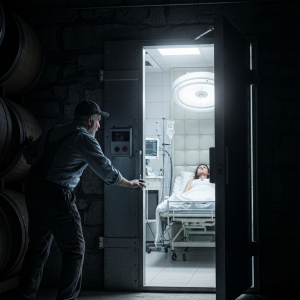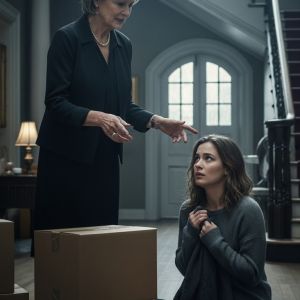Eleanor Vance lived a life of deliberate, curated quiet. To her daughter, Sophie, this quiet was a sign of surrender. It was the beige, predictable world of a retired woman in a suburban house that smelled faintly of lemon polish and old books. Eleanor spent her days gardening, reading, and tinkering with what she vaguely described as “old electronics” in the basement. It was, in Sophie’s MBA-addled mind, a life devoid of passion or ambition.
Sophie, by contrast, was a whirlwind of calculated energy. Fresh out of business school with a head full of buzzwords like “disruption,” “scalability,” and “first-mover advantage,” she saw her mother’s life as a cautionary tale. She loved her mother, but with the condescending pity a hawk might feel for a sparrow. She was determined to soar, to build something, to have her name spoken in the sleek, glass-walled boardrooms of Silicon Valley.
“Mom, you have to do something,” Sophie would often say, gesturing around the comfortable but dated living room. “You’re too smart to just… fade. This house is a museum of a life that’s over.” Eleanor would just smile, a patient, enigmatic expression on her face, and offer her daughter a cup of tea.
The basement was Eleanor’s sanctuary, and it was always locked. Sophie had never bothered to ask for the key. Why would she? It was just a dusty room full of her mom’s weird, unprofitable hobbies. The only sign of any real activity was the steady stream of FedEx and UPS trucks that rumbled down their quiet street.
“Another delivery, Mom?” Sophie would ask, arching an eyebrow as a driver deposited another stack of boxes on the porch.
“Oh, you know,” Eleanor would reply, her hands already busy with a box cutter. “Just buying and selling a few interesting finds on eBay. It keeps my mind sharp.” Sophie would roll her eyes and go back to her laptop, never noticing the sheer volume of the packages, nor the faint, rhythmic hum of machinery that seemed to emanate from beneath the floorboards.
Sophie arrived one Tuesday afternoon with the manic gleam of a zealot. She carried a thick, professionally bound document like a sacred text. It was her business plan, the culmination of her entire worldview, printed in full color on glossy paper. She placed it on the kitchen table with a dramatic flourish.
“This is it, Mom,” she announced, her voice trembling with excitement. “This is ‘Agora.’ The app that’s going to change everything. It’s the future of the artisanal marketplace.”
Eleanor picked it up. She turned the pages slowly, her expression unreadable. The plan was full of charts, projections, and confident declarations. It proposed a sleek, mobile-first platform for a niche market: high-end, artisanal ceramics and pottery.
Sophie launched into her rehearsed pitch, pacing the kitchen. “It’s a fragmented market, run by hobbyists and old-fashioned sellers on clunky websites. There’s no centralization, no brand identity. Agora will consolidate the space, create a curated user experience, and take a 15% commission on every transaction. It’s foolproof.”
Eleanor continued to read, her silence unnerving Sophie. Finally, she closed the proposal and looked at her daughter, her eyes gentle but firm. “It’s an ambitious idea, Sophie. But your customer acquisition cost is wildly optimistic. You haven’t accounted for supply chain logistics, seller verification, or the cost of returns. It’s incredibly risky.”
Sophie’s face fell. She had expected applause, not a critique. “That’s what seed money is for! To solve those problems! Which brings me to why I’m here.”
She took a deep breath. “I need $500,000 to get this off the ground. I need you to sell the house.”
Eleanor’s quiet demeanor finally cracked. A flicker of deep hurt crossed her features. “Sell the house? Sophie, this is our home. This is where you grew up. It’s all I have.”
The rejection, combined with her mother’s perceived lack of vision, made something snap in Sophie. All her pent-up frustration and condescension came pouring out. She slammed her hand on her beautiful business plan, scattering it across the table.
“I cannot believe how selfish you are!” she screamed, her voice raw with rage and disappointment. “You’d rather cling to this dusty, old mausoleum than invest in your own daughter’s future! This is why you are who you are! You have no ambition! You’re a failure, and you want me to be one too!”
The word “failure” hung in the air, ugly and unforgivable.
Eleanor’s response was a profound and wounded silence. She didn’t argue or defend herself. She simply picked up the scattered pages of the business plan, stacked them neatly, and pushed them back toward her daughter. Her face was a mask of disappointment. The fight was over.
Furious and emboldened by her mother’s passivity, Sophie snatched the plan and stormed out. “Fine! I’ll do it myself!” she yelled from the doorway. “I’ll find investors who actually understand vision! And when I’m on the cover of Forbes, don’t come asking me for anything!”
In the following weeks, the house became a place of two separate, parallel universes. Upstairs, Sophie lived in a frantic bubble of startup culture. Her room was a command center of whiteboards, sticky notes, and the incessant glow of a laptop screen. She networked relentlessly, cold-calling investors, and refining her pitch.
She practiced in front of the mirror, her voice growing more confident with each repetition. “We will disrupt this space,” she would declare to her reflection. “It is currently dominated by amateurs, by quaint little online shops that lack the infrastructure to scale. Agora will be the shark in their cozy little pond.”
Downstairs, in the basement, Eleanor Vance went to work. The moment she unlocked the heavy door and stepped inside, the quiet, retired widow disappeared. She was in her kingdom.
The basement was not a dusty workshop; it was a gleaming, state-of-the-art logistics hub. One wall was lined with humming servers, their blinking green lights reflecting off the polished concrete floor. Another held rows upon rows of meticulously labeled shelves, filled with exquisite pottery from artisans around the world. In the center of the room were three ergonomic packing stations, complete with automated label printers and scales. This was the heart of a multi-million dollar e-commerce empire. This was the heart of “The Kiln.”
Eleanor would spend her days managing inventory, negotiating with artists, optimizing her site’s SEO, and overseeing her small, remote customer service team. Her “eBaying” was, in reality, a global operation that moved thousands of units a week. Her quiet life wasn’t a retreat; it was a fortress of quiet, staggering competence. And from within this fortress, she watched her daughter prepare to lay siege to a castle she didn’t even know existed.
Sophie, through sheer, relentless hustle, landed the meeting of a lifetime: a pitch to Nexus Ventures, one of the most prestigious VC firms in the country. She walked into their downtown skyscraper feeling like she had already won. The conference room was an exercise in minimalist power, with a long mahogany table and a floor-to-ceiling window overlooking the city.
She was brilliant. She was passionate. She moved through her presentation with the polished confidence of a seasoned pro. The partners, a panel of three stone-faced men and women, listened intently, asking sharp, probing questions which she deftly handled. She was in her element.
Then, she arrived at the slide she had been waiting for. The one that would prove the necessity of her vision. On the massive screen behind her, a simple, elegant logo appeared. It was a stylized flame above the words “The Kiln.”
“And this,” Sophie said, her voice dripping with dismissive confidence, “is our largest, and frankly, our only significant competitor. The Kiln.”
She gestured to the screen. “They’ve done well, I’ll admit, for what they are. A quaint, successful online store, likely run by a single person out of their garage. They have a loyal customer base, but their tech is outdated, they have no mobile presence, and their model is completely unscalable. My app, Agora, will modernize this space, absorb their user base, and push them into obsolescence within eighteen months.”
A thin, almost imperceptible smile touched the lips of the lead investor, an older, impeccably dressed man named Mr. Chen. He let the silence hang for a moment before he spoke.
“An interesting and aggressive strategy, Ms. Vance. You’ve clearly done your homework.” He folded his hands on the table. “However, this particular market is one we know quite well. In fact, before we make any investment in this space, we always consult with our lead technology advisor, who is the foremost expert in this very niche.”
Sophie’s heart swelled with pride. They were taking her seriously. They were bringing in their top expert.
Mr. Chen swiveled his chair slightly and pressed a button on the conference phone. “We’d like to patch in our consultant now to get her thoughts on your proposal.”
He nodded to the large screen. It flickered to life, and a video conference window opened. And staring out from the screen was the face of her mother, Eleanor Vance.
She wasn’t in the kitchen, wearing an apron. She was in a crisp blue blouse, wearing subtle makeup, and seated in a professional home office with soft, flattering lighting. Behind her, a shelf tastefully displayed several beautiful ceramic pieces. She looked poised, powerful, and utterly in control.
Sophie’s blood ran cold. Her confident smile froze and then melted from her face. The clicker in her hand suddenly felt like it weighed a thousand pounds.
Mr. Chen gestured graciously towards the screen, his voice cutting through Sophie’s roaring incomprehension.
“Sophie Vance, I’d like to introduce you to our consultant. This is the anonymous founder and CEO of ‘The Kiln’.”
The world stopped. For Sophie, the luxurious conference room, the expectant faces of the investors, the breathtaking view of the city—it all dissolved into a deafening, white noise. The only reality was the face on the screen. Her mother’s face. Not the patient, slightly weary face she had screamed at in the kitchen, but the calm, authoritative face of a titan of industry. The amateur. The failure.
The investors watched her, their expressions shifting from professional interest to a kind of clinical pity. They were witnessing not just the failure of a pitch, but the complete and utter disintegration of a person’s reality. Sophie’s entire narrative of her life, her carefully constructed identity as the ambitious saviour to her passive mother, was a lie.
On the screen, Eleanor’s expression was not triumphant. It was tinged with a deep, maternal sorrow. She looked at her daughter, standing there exposed and shattered, and spoke, her voice calm and clear through the conference room speakers.
“Hello, Sophie.”
That was all she said. She didn’t need to say more. The two words landed with the force of a physical blow. Sophie opened her mouth, but no sound came out. Her meticulously researched presentation lay in ruins. She had just spent twenty minutes explaining to the founder of the market’s leading company how she was going to drive her out of business with a half-baked, derivative idea.
Mr. Chen cleared his throat, a sound of polite, final dismissal. “Well,” he said, standing up and smoothing his suit jacket. “I believe we have all the information we need. Thank you for your time, Ms. Vance. Your passion is… noteworthy.”
The humiliation was absolute. She had been exposed as a fool. An amateur who was so blinded by arrogance she couldn’t even recognize the industry leader when she was living under the same roof. She stumbled through a wordless exit, not remembering how she collected her things or how she got to the elevator. She walked out of the gleaming skyscraper into the harsh afternoon sun, a ghost in her own life.
The drive home was silent and agonizing. When Sophie walked through the front door, the house felt different. It was no longer a museum; it was a headquarters. The faint hum from beneath the floor was no longer a mystery; it was the sound of her own ignorance.
Eleanor was waiting in the kitchen, a pot of tea brewing. The anger was gone, replaced by a quiet gravity. For a long time, neither of them spoke.
Finally, Eleanor broke the silence. “You saw a house, Sophie. For years, I’ve been building a fortress. You wanted half a million dollars of my money. But what you really need is a million dollars worth of my knowledge. And that, my dear, you have to earn.”
She didn’t offer comfort or absolution. She offered a boundary, and a new, much harder path.
“You want to be in the startup world?” Eleanor asked, her voice leaving no room for argument. “Fine. Your new venture starts tomorrow morning. Eight a.m. sharp. Downstairs.”
She paused, taking a sip of her tea. “I’m offering you a position. An unpaid internship at The Kiln. You’ll start in shipping and receiving. You’ll learn what a supply chain actually is. You’ll learn what a customer really wants. You will learn what business actually is, from the concrete floor up.”
Tears streamed down Sophie’s face. They were not tears of rage, but of profound, gut-wrenching shame. In that moment, she saw her own hubris with sickening clarity. She had demanded the crown without ever understanding the kingdom.
She looked at her mother—this quiet, brilliant woman she had never truly seen before—and nodded, unable to speak.
The next morning, Sophie Vance, MBA, walked down the basement stairs for the first time. The door was unlocked. Inside, the sheer scale and sophistication of the operation took her breath away. Eleanor was already there, holding a packing scanner. She handed it to Sophie without a word.
Her first task was to scan and shelve a new shipment of two hundred ceramic vases from a potter in Kyoto. Her hands, accustomed to a keyboard, felt clumsy with the boxes and packing tape. But as she worked under the quiet, watchful eye of her mother, amidst the hum of a real, thriving business, she knew her true education had just begun. The house was no longer a prison, but a classroom. And she was finally ready to learn.




